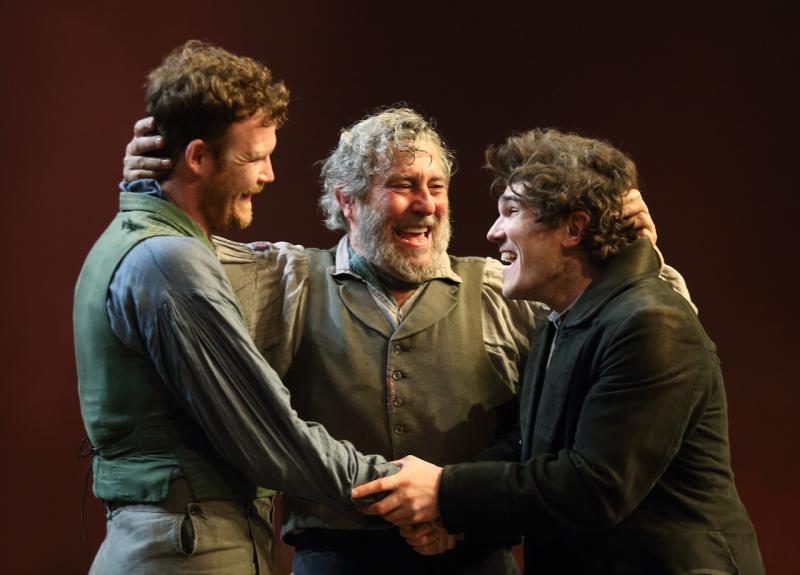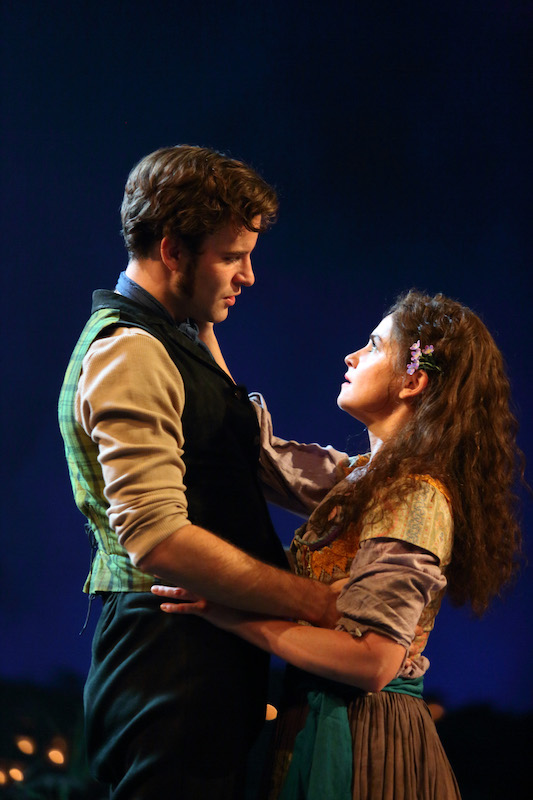Translations, National Theatre review - stunning revival of poignant tragicomedy | reviews, news & interviews
Translations, National Theatre review - stunning revival of poignant tragicomedy
Translations, National Theatre review - stunning revival of poignant tragicomedy
A potent anatomy of how words and power intertwine

At a point in history where – yet again – a few misplaced words from English politicians could wreak havoc with Irish lives, this is a welcome revival of Ian Rickson’s stunning production which first played here to r
The audience enters the Olivier to witness a landscape on which the low-lying clouds and reddish sky create a sense that everything is about to go up in smoke. While there’s an earthy realism to designer Rae Smith’s evocation of 19th century Baile Beag, on which the ramshackle classroom of a "hedge school" sprawls open to the elements, Neil Austin’s smouldering lighting design stokes the latent tension from the start.
Friel’s play shows how you ignore the strictures of language at your peril
In the famous opening of a play which so potently anatomises how power and language intertwine, we watch Seamus O’Hara’s Manus teach Liadán Dunlea’s Sarah how to overcome a speech impediment by saying her name. The link between speech and the breath is one reason why language is so intimately connected with who we are, and as Sarah breathes deep to find words, the echoing sound of the sea powerfully amplifies the elemental nature of her struggle.
It’s 1833, and 18 years after the Battle of Waterloo, the British Empire is very much in the ascent. Yet at first glance, this Irish community – where Dermot Crowley’s happily unwashed Jimmy breathes Ancient Greek more easily than air, Ciaran Hinds’ schoolmaster Hugh mixes Latin with whisky, and Sarah simultaneously finds speech and love – seems immune to such concerns.
That, of course, is the power of theatre: that we are able – unlike any ruthless bureaucrat – to meet and understand each character and their struggles, as well as to appreciate the delicate threads linking their community together like a spider’s web. Friel humorously foreshadows the connection between power and naming with the story of Nelly Ruadh, a new mother who’s causing consternation among the young men of the village by saying she’ll name the baby after the as yet unknown father.
While this provokes much laughter, it of course highlights the ownership wielded through language. This is coming closer as two English soldiers, Rufus Wright’s Captain Lancey and Jack Bardoe’s Lieutenant Yolland, draw new maps for the Ordnance Survey, replacing Irish names with English, as well as ushering in a new standardised form of education.
 What’s so powerful about the play is that while it makes us angry about the crude slam of imperialism, it also shows how two of the "disruptors" come from within the community of Baile Beag itself. Judith Roddy’s powerful, tempestuous Maire is the character who reveals Friel's brilliant theatrical sleight of hand, which means that when the Irish members of the cast appear to be talking in English they are in fact talking in Gaelic. Yet it is also she who declares that English is the language of the future and that she is going to move to America. Fra Fee’s charming charismatic Owen, the schoolmaster’s son who has returned home after many years away, reveals his own linguistic contradictions as he delares he is working as an interpreter for the two British soldiers, who have apparently colonised him by renaming him Roland.
What’s so powerful about the play is that while it makes us angry about the crude slam of imperialism, it also shows how two of the "disruptors" come from within the community of Baile Beag itself. Judith Roddy’s powerful, tempestuous Maire is the character who reveals Friel's brilliant theatrical sleight of hand, which means that when the Irish members of the cast appear to be talking in English they are in fact talking in Gaelic. Yet it is also she who declares that English is the language of the future and that she is going to move to America. Fra Fee’s charming charismatic Owen, the schoolmaster’s son who has returned home after many years away, reveals his own linguistic contradictions as he delares he is working as an interpreter for the two British soldiers, who have apparently colonised him by renaming him Roland.
The wonderfully funny, transcendent love scene at the centre of the play, in which Maire and the English soldier Yolland declare their love for each other, even though they can’t understand each other’s language (pictured above), seems to represent a liberation. In that moment, it does, but very quickly Friel’s play shows that in this historical context you ignore the strictures of language at your peril. Love, here, is a rebellion: and when societal change is so flammable, rebellion will always be met with brutality. Say what you want, and there will be people who will make sure that you will never say anything again.
Rickson’s deeply moving, beautifully modulated production returns with many of cast from last year. Among the new cast members, Fra Fee is superb as the dynamic, conflicted Owen, while Liadán Dunlea brings a quiet and compelling dignity to her role as Sarah. While the fate of both Ireland and the rest of the British Isles is hanging on the precise deployment of language, Friel’s devastating insights make for salutary watching. Go, and if you can bear it, take a politician.
rating
Explore topics
Share this article
The future of Arts Journalism
You can stop theartsdesk.com closing!
We urgently need financing to survive. Our fundraising drive has thus far raised £49,000 but we need to reach £100,000 or we will be forced to close. Please contribute here: https://gofund.me/c3f6033d
And if you can forward this information to anyone who might assist, we’d be grateful.

Subscribe to theartsdesk.com
Thank you for continuing to read our work on theartsdesk.com. For unlimited access to every article in its entirety, including our archive of more than 15,000 pieces, we're asking for £5 per month or £40 per year. We feel it's a very good deal, and hope you do too.
To take a subscription now simply click here.
And if you're looking for that extra gift for a friend or family member, why not treat them to a theartsdesk.com gift subscription?
more Theatre
 Othello, Theatre Royal, Haymarket review - a surprising mix of stateliness and ironic humour
David Harewood and Toby Jones at odds
Othello, Theatre Royal, Haymarket review - a surprising mix of stateliness and ironic humour
David Harewood and Toby Jones at odds
 Macbeth, RSC, Stratford review - Glaswegian gangs and ghoulies prove gripping
Sam Heughan's Macbeth cannot quite find a home in a mobster pub
Macbeth, RSC, Stratford review - Glaswegian gangs and ghoulies prove gripping
Sam Heughan's Macbeth cannot quite find a home in a mobster pub
 The Line of Beauty, Almeida Theatre review - the 80s revisited in theatrically ravishing form
Alan Hollinghurst novel is cunningly filleted, very finely acted
The Line of Beauty, Almeida Theatre review - the 80s revisited in theatrically ravishing form
Alan Hollinghurst novel is cunningly filleted, very finely acted
 Wendy & Peter Pan, Barbican Theatre review - mixed bag of panto and comic play, turned up to 11
The RSC adaptation is aimed at children, though all will thrill to its spectacle
Wendy & Peter Pan, Barbican Theatre review - mixed bag of panto and comic play, turned up to 11
The RSC adaptation is aimed at children, though all will thrill to its spectacle
 Hedda, Orange Tree Theatre review - a monument reimagined, perhaps even improved
Scandinavian masterpiece transplanted into a London reeling from the ravages of war
Hedda, Orange Tree Theatre review - a monument reimagined, perhaps even improved
Scandinavian masterpiece transplanted into a London reeling from the ravages of war
 The Assembled Parties, Hampstead review - a rarity, a well-made play delivered straight
Witty but poignant tribute to the strength of family ties as all around disintegrates
The Assembled Parties, Hampstead review - a rarity, a well-made play delivered straight
Witty but poignant tribute to the strength of family ties as all around disintegrates
 Mary Page Marlowe, Old Vic review - a starry portrait of a splintered life
Tracy Letts's Off Broadway play makes a shimmeringly powerful London debut
Mary Page Marlowe, Old Vic review - a starry portrait of a splintered life
Tracy Letts's Off Broadway play makes a shimmeringly powerful London debut
 Little Brother, Soho Theatre review - light, bright but emotionally true
This Verity Bargate Award-winning dramedy is entertaining as well as thought provoking
Little Brother, Soho Theatre review - light, bright but emotionally true
This Verity Bargate Award-winning dramedy is entertaining as well as thought provoking
 The Unbelievers, Royal Court Theatre - grimly compelling, powerfully performed
Nick Payne's new play is amongst his best
The Unbelievers, Royal Court Theatre - grimly compelling, powerfully performed
Nick Payne's new play is amongst his best
 The Maids, Donmar Warehouse review - vibrant cast lost in a spectacular-looking fever dream
Kip Williams revises Genet, with little gained in the update except eye-popping visuals
The Maids, Donmar Warehouse review - vibrant cast lost in a spectacular-looking fever dream
Kip Williams revises Genet, with little gained in the update except eye-popping visuals
 Ragdoll, Jermyn Street Theatre review - compelling and emotionally truthful
Katherine Moar returns with a Patty Hearst-inspired follow up to her debut hit 'Farm Hall'
Ragdoll, Jermyn Street Theatre review - compelling and emotionally truthful
Katherine Moar returns with a Patty Hearst-inspired follow up to her debut hit 'Farm Hall'
 Troilus and Cressida, Globe Theatre review - a 'problem play' with added problems
Raucous and carnivalesque, but also ugly and incomprehensible
Troilus and Cressida, Globe Theatre review - a 'problem play' with added problems
Raucous and carnivalesque, but also ugly and incomprehensible

Add comment